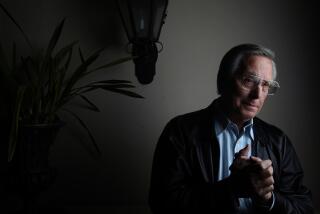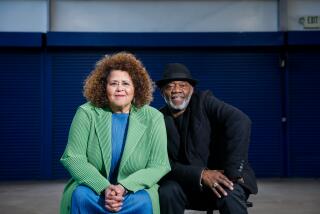THEATER REVIEW : Raucous ‘Clockwork Orange’ Restores Original Ending
- Share via
Real horrorshow.
That’s how Alex, the teen-age rebel protagonist of “A Clockwork Orange,” would describe Company of Angels’ raucous and thoughtfully confrontational stage adaptation of the late Anthony Burgess’ eerily prophetic 1962 novel.
Horrorshow means “thumbs-up” in Nadsat, the English/Russian street dialect spoken by Alex and his marauding gang of lawless droogs--and their adventures make for gripping if at times overextended theater. Yet the word’s other connotations prove equally apt, as horrific violence plays out against the ominous backdrop of a totalitarian regime in the not-too-distant future.
Burgess’ tale is deservedly renowned for interlacing its howling indulgence in our darkest impulses with sociological analysis, meditations on the nature of free will and dazzling linguistic whimsy. But its intended concept as a coming-of-age saga is less well-known, due to the deletion of the novel’s original ending from all but the most recent American printings, as well as from Stanley Kubrick’s 1971 film.
That ending--in which 21-year-old Alex faces an unexpected moral crisis and makes a surprising choice--has been restored in Ed Trotta’s staging. His amalgam of the author’s 1986 adaptation (minus generally reviled musical numbers) and additional material from the book is commendably faithful to the complexities of Burgess’ complex vision. But that fidelity also imposes constraints that aren’t entirely surmounted, particularly in plot elements that cry out to be streamlined or reinterpreted for the stage.
Fitting the sprawling tale into a thimble-sized space is a credit to Andrew D’Ambrosio (abstract sets, projections and ingeniously evocative lighting) and Braxston Lee (high-amplitude sound).
*
Discriminating “Clockwork” fans will relish David Blanchard’s deft portrayal of Alex, with his arrogant swagger, sardonic humor and oddly refined aesthetic sensibilities. Neophytes will appreciate the interpretive clarity he brings to even the bolshiest gavoreeting in Burgess’ invented dialect.
Rounding out Alex’s droog gang with harrowing abandon are loutish Dim (Otto Coelho, looking like a young Newt Gingrich), deliciously nasty Georgie (Sheila Sawney, in one of several gender-bending castings) and Pete (Emmett James, who pulls off an understated transformation at the end).
In multiple roles, the 11 supporting actors span a perceptible although never embarrassing range of skills. Kate Bridges, Joe Medalis and Sabrina Hill are the standouts. Victims or victimizers, each represents a different facet of a world in which people are mechanically obedient to social conditioning.
The story’s most subversive aspect is the way it forces our sympathies into alliance with the monstrous Alex because he’s the only one who reflects on his circumstances and chooses to forsake conventional morality for “the other shop.” Unfortunately, the clearest articulations of his self-awareness are in the book’s reflective asides, pared here to keep the play’s length barely manageable.
Ironically, the restored ending further erodes the integrity of Alex’s chosen way of life by dismissing it as a phase on the road to maturity. It’s a judgment that feels tacked-on, not organically evolved--a curious instance where morality proves more gratuitous than violence.
* “A Clockwork Orange,” Company of Angels, 2106 Hyperion Ave., Silver Lake. Thursdays, Fridays, Saturdays, 8 p.m.; Sundays, 5 p.m. Ends Aug. 5. $17. (213) 466-1767. Running time: 3 hours.
More to Read
The biggest entertainment stories
Get our big stories about Hollywood, film, television, music, arts, culture and more right in your inbox as soon as they publish.
You may occasionally receive promotional content from the Los Angeles Times.










